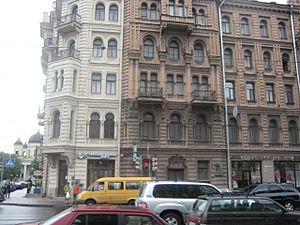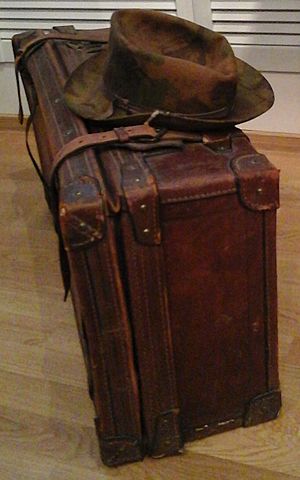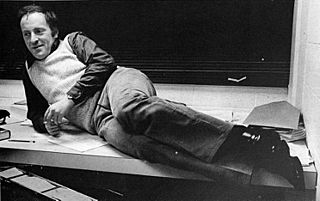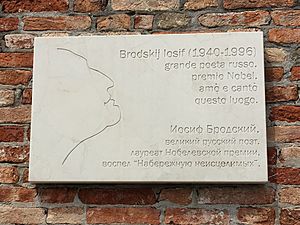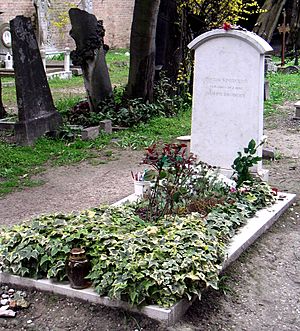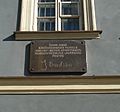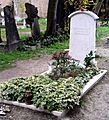Joseph Brodsky facts for kids
Quick facts for kids
Joseph Brodsky
|
|
|---|---|
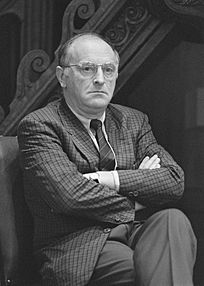
Brodsky in 1988
|
|
| Native name |
Иосиф Александрович Бродский
|
| Born | Iosif Aleksandrovich Brodsky 24 May 1940 Leningrad, Russian SFSR, Soviet Union (now Saint Petersburg, Russia) |
| Died | 28 January 1996 (aged 55) New York City, United States |
| Resting place | Isola di San Michele, Venice, Veneto, Italy |
| Occupation | Poet, essayist |
| Language | Russian (poetry), English (prose) |
| Citizenship |
|
| Notable works |
|
| Notable awards |
|
| Spouse |
Maria Sozzani
(m. 1990) |
| Partner |
|
| Children |
|
Joseph Brodsky (born Iosif Aleksandrovich Brodsky; 24 May 1940 – 28 January 1996) was a famous poet and essay writer. He was born in Leningrad, which was part of the Soviet Union at the time.
Brodsky faced problems with the Soviet government and was forced to leave his home country in 1972. He moved to the United States with help from other writers like W. H. Auden. In the U.S., he taught at several universities, including Yale and Columbia.
In 1987, Brodsky won the Nobel Prize in Literature for his amazing writing, which was praised for its clear ideas and strong poetic feeling. He was also named the United States Poet Laureate in 1991, which means he was recognized as a leading poet in the U.S.
Many experts believe Brodsky is one of the most important modern Russian poets. He is known for his deep thoughts and powerful words.
Contents
Early Life and Challenges
Joseph Brodsky was born into a Jewish family in Leningrad. His father, Aleksandr Brodsky, was a photographer for the Soviet Navy, and his mother, Maria Volpert Brodskaya, was an interpreter. His family lived in small, shared apartments and faced hardships because they were Jewish.
As a young child, Brodsky survived the terrible Siege of Leningrad, where he and his parents almost starved. This experience caused him health problems later in life. Brodsky felt like an outsider from a young age and often disagreed with the government's ideas.
He was a lively student and left school at 15. He tried different jobs, like working with machines and in hospitals. Even without much formal schooling, Brodsky taught himself a lot. He learned Polish to read poets like Czesław Miłosz and English to read John Donne. He also became very interested in history, religion, and poetry.
Becoming a Writer
Starting His Poetic Journey
Brodsky began writing his own poems and translating other works in 1955. He shared his writings secretly, and some were published in an underground magazine called Sintaksis. His early poems were not about politics. By 1958, he was already known in literary groups for poems like "The Jewish cemetery near Leningrad."
In 1960, Brodsky met Anna Akhmatova, a very famous Russian poet. She encouraged his writing and became his mentor. In 1962, he met Marina Basmanova, a young artist. They started a relationship, and Brodsky wrote many love poems to her.
Facing Trouble with the Government
In 1963, a newspaper in Leningrad criticized Brodsky's poetry, calling it "anti-Soviet." His writings were taken, he was questioned, and even sent to a mental hospital twice before being arrested. In 1964, he was accused of "social parasitism" by the Soviet government. This meant they thought he wasn't contributing enough to society because he was a poet and had odd jobs.
The judge asked him, "Who said you are a poet?" Brodsky famously replied, "No one. Who said I was part of the human race?"
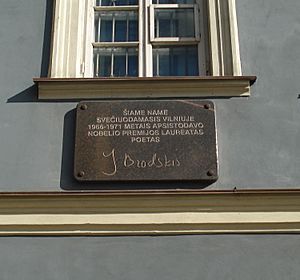
Brodsky was sentenced to five years of hard labor and spent 18 months on a farm in a remote area called Norenskaya. Even though it was a difficult place without modern comforts, he found some peace there. He wrote, chopped wood, and read English and American poetry. His mentor, Anna Akhmatova, even joked that the government was helping him build an interesting life story.
After protests from famous writers and artists, including Jean-Paul Sartre, Brodsky's sentence was shortened in 1965. His case became well-known in the West, making him a symbol of artistic freedom against a strict government.
Brodsky's son, Andrei, was born in 1967. Marina Basmanova ended their relationship, and Andrei was given his mother's last name to protect him from the political problems Brodsky faced. Brodsky continued to write love poems to Marina.
He kept writing over the next seven years, and many of his works were translated and published outside the Soviet Union. However, he was not allowed to travel. In 1972, the authorities forced him to leave the Soviet Union. On June 4, 1972, he was put on a plane to Vienna, Austria. He never returned to Russia and never saw Marina Basmanova again.
In Austria, he met Carl Ray Proffer and W. H. Auden, who helped him move to the United States.
Life in the United States
Brodsky settled in Ann Arbor, Michigan, and became a poet-in-residence at the University of Michigan. He later taught as a visiting professor at other universities, including Columbia University and Cambridge University. In 1978, he received an honorary degree from Yale University.
In 1980, he moved to New York City and received a "genius" award from the John D. and Catherine T. MacArthur Foundation. In 1986, his collection of essays, Less Than One, won a major award, and he received an honorary doctorate from Oxford University.
Nobel Prize and Poet Laureate
In 1987, Joseph Brodsky won the Nobel Prize in Literature. He was the fifth Russian-born writer to receive this honor. When asked if he was American or Russian, he replied, "I'm Jewish; a Russian poet, an English essayist – and, of course, an American citizen." The Nobel committee praised his writing for its "clarity of thought and poetic intensity."
In 1991, Brodsky became the United States Poet Laureate. He believed that reading poetry was very important for society. He said that if people don't read poets, society might lose its ability to express itself well. He wanted to make poetry more accessible to everyone.
In 1990, Brodsky married Maria Sozzani, a student with Russian and Italian roots. They had a daughter, Anna, in 1993.
His son, Andrei Basmanov, was finally able to visit him in New York in the 1990s after the Soviet Union fell. They built a father-son relationship, and Andrei later had three children, who Brodsky recognized as his grandchildren.
Joseph Brodsky passed away from a heart attack on January 28, 1996, at the age of 55. He had faced health issues for many years. He was buried in Venice, Italy, a city he loved. A plaque was placed on his former home in Saint Petersburg to honor him.
Brodsky's Works
Brodsky is best known for his poetry collections, such as A Part of Speech (1977) and To Urania (1988). His essay collection, Less Than One (1986), also won a major award. He also wrote a play called Marbles (1989) and a book about Venice called Watermark (1992). He wrote in both Russian and English, sometimes translating his own work.
Themes and Style
Brodsky's poetry often explored deep ideas about nature, what it means to be human, death, and the purpose of life. He combined different ideas, like physical places and thoughts about those places, or the past, present, and future. His writing style was often thoughtful and unique.
His collection To Urania includes poems written during his time in America, focusing on themes of memory, home, and feeling lost. His essays often looked at other poets and writers, as well as stories from his own life.
A key idea in Brodsky's writing was the strong connection between a poet and society. He believed that literature could help people and improve language and culture. He even suggested that Western literature helped the world get through tough times like wars and strict governments in the 20th century.
Awards and Recognition
Joseph Brodsky received many awards and honors throughout his life:
- 1978 – Honorary degree from Yale University
- 1979 – Member of the American Academy and Institute of Arts and Letters
- 1981 – John D. and Catherine T. MacArthur Foundation award (often called a "genius" grant)
- 1986 – Honorary doctorate from Oxford University
- 1986 – National Book Critics Award for Criticism, for his essay collection Less Than One
- 1987 – Nobel Prize in Literature
- 1991 – United States Poet Laureate
- 1991 – Struga Poetry Evenings Golden Wreath Award (a major international poetry award)
Selected Works
Poetry Collections
- 1973: Selected Poems
- 1977: A Part of Speech
- 1988: To Urania: Selected Poems, 1965–1985
- 1996: So Forth: Poems
- 2000: Collected Poems in English, 1972–1999
Essay Collections
- 1986: Less Than One: Selected Essays
- 1992: Watermark (about Venice)
- 1995: On Grief and Reason: Essays
Plays
- 1989: Marbles
Images for kids
-
Plaque marking where Brodsky stayed in Vilnius
See also
 In Spanish: Joseph Brodsky para niños
In Spanish: Joseph Brodsky para niños
 | William L. Dawson |
 | W. E. B. Du Bois |
 | Harry Belafonte |


